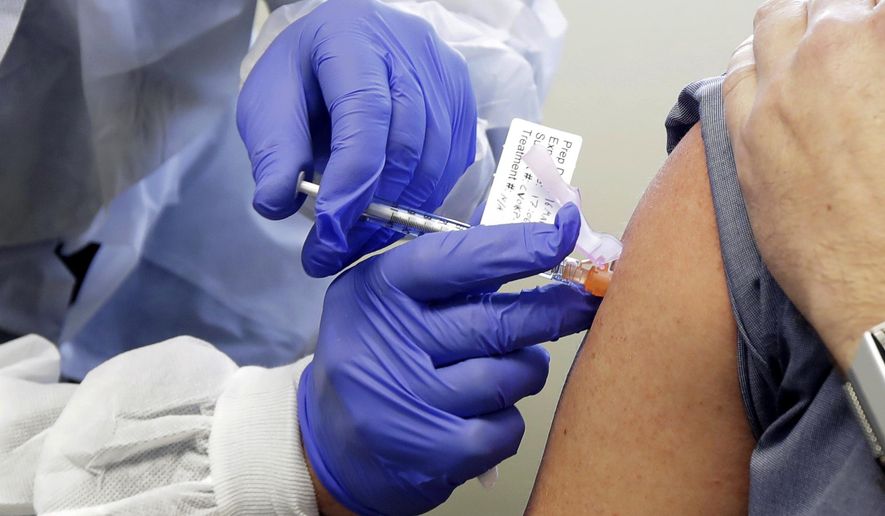SAVANNAH, Ga. (AP) - Savannah’s Dr. Paul Bradley, who in July dosed the first patient in biotechnology company Moderna’s U.S. phase 3 COVID-19 vaccine trial, on Monday celebrated the apparent success of that vaccine and the part his hometown is playing in its development.
Moderna announced Monday that preliminary analysis of its coronavirus vaccine shows it’s almost 95 percent effective at preventing illness.
“Savannah’s made a footprint,” said Bradley, who has had an internal medical practice in Savannah for more than 30 years, has been involved with medical research the whole time. Bradley’s office, which works with Meridian Clinical Research with trials overseen by the U.S. Food and Drug Administration, is the only one in the area involved in COVID vaccine testing, he said. He has about 1,000 patients enrolled.
Moderna plans to submit for an Emergency Use Authorization with the U.S. Food and Drug Administration in the coming weeks. If approved, Moderna expects to have about 20 million doses of its vaccine ready to ship in the U.S. by the end of 2020, the company indicated in a press release Monday. Moderna remains on track to manufacture 500 million to 1 billion doses globally in 2021.
Bradley was also involved with testing coronavirus vaccines for Pfizer, Merck, Novavax and Sanofi. Earlier this month Pfizer announced promising preliminary results with its vaccine, which like the Moderna vaccine uses genetic material called messenger RNA. It boasts a greater than 90 percent effectiveness.
Nurse Practitioner Elissa Greene was one of the first nationwide to participate in the third and last phase of the Moderna vaccine’s trial, receiving what she guessed was the vaccine rather than a placebo in the double blind study.
“It feels amazing,” she said Monday on hearing Moderna’s preliminary results. “It felt amazing at the beginning, it still feels exciting.”
Greene lives in the Savannah area but has been working in Maine doing Medicare in-home wellness assessments.
“I tell people to understand that there’s nothing alive in the vaccine and the vaccine cannot hurt them, right?” she said. “And that if they have (mild) symptoms as a result of the vaccine, that’s a good thing, because it means they have an active immune system. And then, the second thing I tell people is that if they want to have Christmas and Thanksgiving safely with their family next year, I would recommend that they get the vaccine.”
U.S. Rep. Buddy Carter, a pharmacist, is also among the vaccine volunteers.
“I think it is very important for me as a member of Congress, and also as a member of the doctor’s caucus and a health care professional to set a good example,” he said in an interview on the Savannah Morning News’ Commute podcast Tuesday. “And I’ve done that. I’ve volunteered. I’m a part of the clinical trials for the Pfizer vaccine. I had my first shot about a month ago, and then I had my booster shot last week.”
Ardsley Park resident Michelle Solomon volunteered to be in the trial in part because of her 81-year-old dad.
“My dad is in an assisted living facility,” she said. “So obviously, he’s extremely high risk, and he’s in poor health. And it makes me feel a lot more confident about spending time with him.”
Savannah was one of more than seven dozen sites around the country where the vaccine developed by the National Institutes of Health and Boston-based Moderna was tested. A nationwide total of 30,000 volunteers made it the world’s biggest COVID-19 vaccine study in July.
Savannah was important not only as the first site to get going with the last two stages of the vaccine trial, Bradley said. Chatham County’s demographics, with a mix of Black and white, was also important.
“Because we needed to make sure that this vaccine works in all ethnic groups,” he said. “Some ethnic groups have great phobias when it comes to vaccinations. And it was really important to have significant numbers to be able to prove safety and efficacy.”
The preliminary 95% efficacy of the Moderna vaccine outstripped expectations.
“This was our pie in the sky best case scenario,” Bradley said. “They only had to hit 50% to get approved. And I think Dr. Fauci said that we would have been happy at 60%.”
Bradley continues to enroll volunteers in coronavirus vaccine clinical trials.
“We are enrolling now for Merck and Sanofi. They’re just getting cranked up,” he said. “And you say, ‘why would you want it now?’ Because it’s a big world. And they got to produce a lot of vaccines. And then you say, ‘Well, what now that we know we’ve got one that works?’ Realistically, it’s going to probably be spring or summer before most people would have the possibility of getting it. And what the companies are saying is this: As soon as a person can get the real vaccine in the future, they’ll be able to (drop) out of the trials.”
Bradley, who can’t be in the clinical trials as a patient because it would be a conflict of interest, is eager to get the vaccine when it’s available.
“I tell them that when it comes to getting the vaccine, they’ll know they’re in the right line if they see my back,” he said. “Mm, hmm. I think I plan on being as close to the front of the line as they’ll let me.”




Please read our comment policy before commenting.